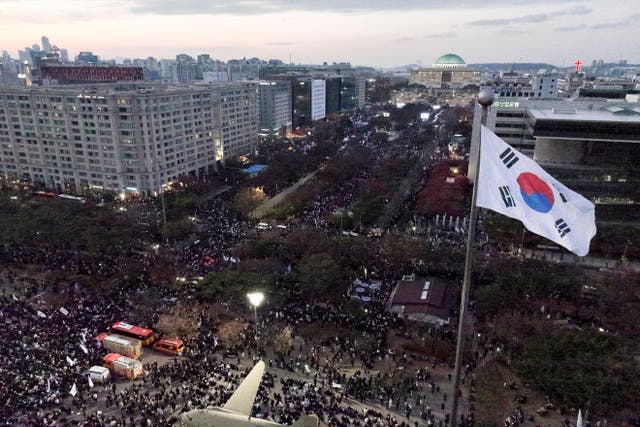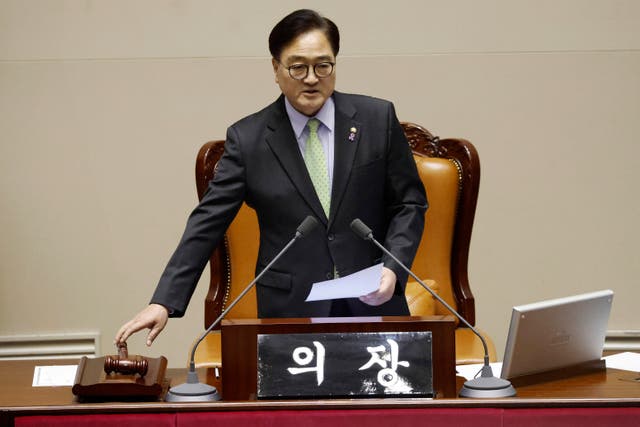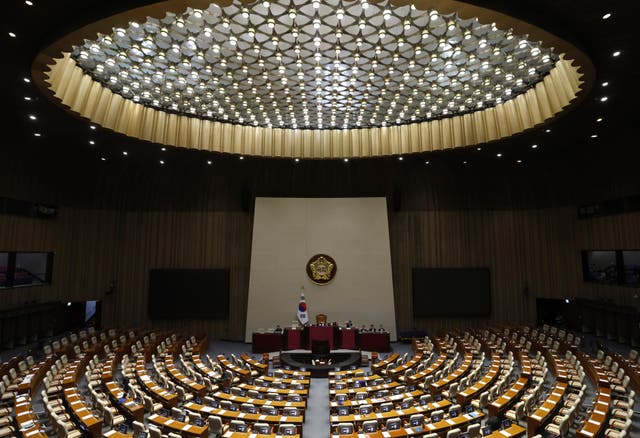South Korean President’s impeachment less likely as top party boycotts vote
Yoon Suk Yeol’s martial law announcement sparked chaos in South Korea last week.

Most ruling party legislators are boycotting a parliamentary vote to deny a two-thirds majority sought by the opposition to impeach President Yoon Suk Yeol over his short-lived imposition of martial law, as protesters called for his removal.
The likely defeat of the motion is expected to intensify public protests calling for Mr Yoon’s removal and deepen political chaos in South Korea, with a survey suggesting a majority of South Koreans support the President’s impeachment.
Mr Yoon’s martial law declaration drew criticism from his own ruling conservative party, but it is also determined to oppose Mr Yoon’s impeachment because it fears losing the presidency to liberals.
Impeaching Mr Yoon would require support from two-thirds of the National Assembly, or 200 of its 300 members.

The opposition-controlled parliament began a vote earlier on Saturday, but only three members from PPP took part with opposition members.
If the number of legislators who cast ballots does not reach 200, the motion will be scrapped at midnight, according to National Assembly.
Opposition parties could submit a new impeachment motion after a new parliamentary session opens next Wednesday.
National Assembly Speaker Woo Won Shik urged ruling party members to return to the chamber to participate in the vote, stressing that it was closely watched by the nation and also the world.
“Don’t make a shameful judgment and please vote based on your convictions,” Mr Woo said. “I plead to you, for the future of the Republic of Korea.”

Mr Yoon said: “The declaration of this martial law was made out of my desperation. But in the course of its implementation, it caused anxiety and inconveniences to the public. I feel very sorry over that and truly apologize to the people who must have been shocked a lot.”
Since taking office in 2022, Mr Yoon has struggled to push his agenda through an opposition-controlled parliament and grappled with low approval ratings amid scandals involving himself and his wife.
In his martial law announcement on Tuesday night, the President called parliament a “den of criminals” bogging down state affairs and vowed to eliminate “shameless North Korea followers and anti-state forces”.

Tuesday night saw special forces troops encircling the parliament building and army helicopters hovering over it, but the military withdrew after the National Assembly unanimously voted to overturn the decree, forcing Yoon to lift it before daybreak on Wednesday.
The declaration of martial law was the first of its kind in more than 40 years in South Korea. Eighteen legislators from the ruling party voted to reject Mr Yoon’s martial law decree along with opposition members.
The passage of Mr Yoon’s impeachment motion appeared more likely on Friday when the chair of his party called for his removal on Friday, but the party remained formally opposed to impeachment.
On Saturday, tens of thousands of people packed streets near the National Assembly, waving banners, shouting slogans and dancing and singing along to K-pop songs with lyrics changed to call for Mr Yoon’s removal.
A smaller crowd of Mr Yoon’s supporters, which still seemed to be in the thousands, rallied in separate streets in Seoul, decrying the impeachment attempt they saw as unconstitutional.





